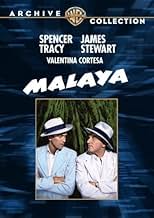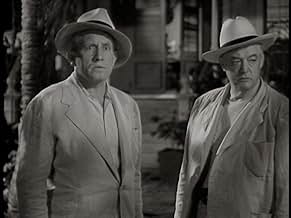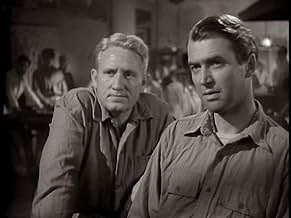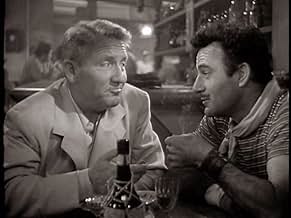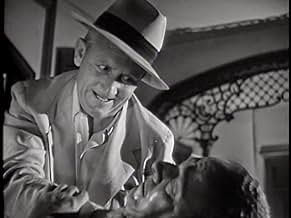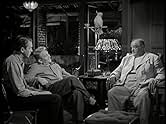IMDb-BEWERTUNG
6,5/10
1579
IHRE BEWERTUNG
Füge eine Handlung in deiner Sprache hinzuNewspaperman Royer convinces government officials of a plan to obtain rubber by smuggling it out from under the Japanese. Carnahan is let out of prison to help.Newspaperman Royer convinces government officials of a plan to obtain rubber by smuggling it out from under the Japanese. Carnahan is let out of prison to help.Newspaperman Royer convinces government officials of a plan to obtain rubber by smuggling it out from under the Japanese. Carnahan is let out of prison to help.
- Regie
- Drehbuch
- Hauptbesetzung
- Auszeichnungen
- 2 wins total
Valentina Cortese
- Luana
- (as Valentina Cortesa)
Lester Matthews
- Matisson
- (Gelöschte Szenen)
Joel Allen
- Federal Agent
- (Nicht genannt)
Besmark Auelua
- Henchman
- (Nicht genannt)
George M. Carleton
- Small Businessman
- (Nicht genannt)
Silan Chan
- Malay Girl
- (Nicht genannt)
Spencer Chan
- Chinese Shipmaster
- (Nicht genannt)
Joseph Crehan
- Businessman with Pipe
- (Nicht genannt)
Empfohlene Bewertungen
Spencer Tracy and James Stewart preside over a terrific cast in "Malaya," a 1949 film also starring Valentina Cortese, Sydney Greenstreet, John Hodiak, Lionel Barrymore, Roland Winters and Gilbert Roland.
This is a fictional account of a very real situation involving the shortage of rubber during World War II. Japan really dominated the countries that had the rubber, and there was smuggling of rubber to the U.S. The situation involving Tracy and Stewart, however, never happened.
Tracy plays a con named Carnahan, whom the government releases from Alcatraz in order to spearhead this project, and Stewart plays John Royer, a former reporter with a shady enough past that the government (represented by John Hodiak) thinks he's a good bet to go into Malaya and smuggle tons of rubber out of that country and pay with gold. Carnahan knows the country like the back of his hand and has the connections. He and Royer pose as Irish sailors looking for work in order to get around a suspicious Colonel Tomura (Richard Loo) while they are helped by an old friend of Carnahan's, The Dutchman (Sydney Greenstreet). Cortese has the Dietrich role, that of a singer in love with Carnahan.
There are some exciting scenes in this film, and it holds one's attention. One of the best performances comes from Gilbert Roland, who leads the smugglers handpicked by The Dutchmen. He's very convincing.
As for Tracy and Stewart, well, although Tracy started out in tough guy Wallace Beery roles, 1949 was a little late for him to be taking them up again. Actually Hodiak would have been good, or Bogart, or John Wayne, Jimmy Cagney, someone along those lines. I thought Stewart was very good and that the two of them made an effective team. Someone said he came off as a nice guy. I thought he did cynic and hardboiled well. You can be cynical and hardboiled and averse to physical violence.
All in all, pretty good.
This is a fictional account of a very real situation involving the shortage of rubber during World War II. Japan really dominated the countries that had the rubber, and there was smuggling of rubber to the U.S. The situation involving Tracy and Stewart, however, never happened.
Tracy plays a con named Carnahan, whom the government releases from Alcatraz in order to spearhead this project, and Stewart plays John Royer, a former reporter with a shady enough past that the government (represented by John Hodiak) thinks he's a good bet to go into Malaya and smuggle tons of rubber out of that country and pay with gold. Carnahan knows the country like the back of his hand and has the connections. He and Royer pose as Irish sailors looking for work in order to get around a suspicious Colonel Tomura (Richard Loo) while they are helped by an old friend of Carnahan's, The Dutchman (Sydney Greenstreet). Cortese has the Dietrich role, that of a singer in love with Carnahan.
There are some exciting scenes in this film, and it holds one's attention. One of the best performances comes from Gilbert Roland, who leads the smugglers handpicked by The Dutchmen. He's very convincing.
As for Tracy and Stewart, well, although Tracy started out in tough guy Wallace Beery roles, 1949 was a little late for him to be taking them up again. Actually Hodiak would have been good, or Bogart, or John Wayne, Jimmy Cagney, someone along those lines. I thought Stewart was very good and that the two of them made an effective team. Someone said he came off as a nice guy. I thought he did cynic and hardboiled well. You can be cynical and hardboiled and averse to physical violence.
All in all, pretty good.
There is a scene that makes the whole picture worthwhile (although it is otherwise pretty ordinary):
Sydney GREENSTREET is entering a room after app. 2/3 of the movie, where Spencery Tracey has just been "treated kindly" in an "interview", Greenstreet is sweating (as always), sitting down and looking at the molestor of Tracy, then says (roughly): "If you say this was necessary, then of course it was necessary, but wasn't that much for a bottle of poor booze?". The officer say: "But he broke our rules". Greenstreet: "A man who drinks and then doesn't break any rules is no man. Drinking and making troubles goes together, this is also a rule." What a line !! Officer: "I love your logic." Of course these are not exactly the lines from the picture, cause I saw the German dubbed version and re-translated them, but they can only be better in the English version.
Hilarious! Tape it, when shown on TV next time and get to that scene, it is just great!
Sydney GREENSTREET is entering a room after app. 2/3 of the movie, where Spencery Tracey has just been "treated kindly" in an "interview", Greenstreet is sweating (as always), sitting down and looking at the molestor of Tracy, then says (roughly): "If you say this was necessary, then of course it was necessary, but wasn't that much for a bottle of poor booze?". The officer say: "But he broke our rules". Greenstreet: "A man who drinks and then doesn't break any rules is no man. Drinking and making troubles goes together, this is also a rule." What a line !! Officer: "I love your logic." Of course these are not exactly the lines from the picture, cause I saw the German dubbed version and re-translated them, but they can only be better in the English version.
Hilarious! Tape it, when shown on TV next time and get to that scene, it is just great!
Malaya (1949)
It would be nice to love this movie—with a strong theme of wartime ingenuity and bravery, and with three stellar actors—but by the end I was thinking everyone involved was just going through the motions. That's probably enough in many ways with people this naturally gifted on screen, and the movie is enjoyable, no question. With all the borrowings or references to earlier classics (Sydney Greenstreet even has a big bird as a pet, as in "Casablanca"), it makes for a fun time.
The premise starts with some very compact storytelling—a somewhat disreputable man (James Stewart) is overheard saying he could smuggle rubber out of British Malaya (now Malaysia). It's WWII and the Army likes the idea enough to send him off with an ex-con (Spencer Tracy) who knows the area well. (This is all arranged with the help of Lionel Barrymore in a small role.)
Then the adventure begins as they penetrate with surprising ease the rubber plantations and arrange with the generally friendly locals and ex-pats to get their hidden stockpiles. The Japanese do eventually catch on and there is fun there, but not before a couple of torch songs and some humorous excess as usual from the likable Greenstreet.
Frankly, things never get exciting or even suspenseful, though interesting all along. One huge problem (for me) was a complete lack of details. The two men would say, okay, let's go get this rubber here, and they meet the plantation owner and there is some talk and then suddenly they are going down the river with some little barges. The Japanese have no suspicions, and the local smugglers are all these cheerful Resistance Fighter types who really like to help a lot.
It would be fun to know if a young viewer finds this exotic and fun or laughable. It's somewhere between in all. And what honestly holds it together for anyone who likes the actors is just watching familiar faces in new roles. That is one of the endless interests of the movies.
See it? Sure, if you already like older films or WWII films. It's not bad. The director Richard Thorpe is quite unknown these days, but the cinematographer is a standard bearer of he period, George Folsey, and that makes every scenes look terrific. Yeah, it's not at all bad. But it ain't great, either.
It would be nice to love this movie—with a strong theme of wartime ingenuity and bravery, and with three stellar actors—but by the end I was thinking everyone involved was just going through the motions. That's probably enough in many ways with people this naturally gifted on screen, and the movie is enjoyable, no question. With all the borrowings or references to earlier classics (Sydney Greenstreet even has a big bird as a pet, as in "Casablanca"), it makes for a fun time.
The premise starts with some very compact storytelling—a somewhat disreputable man (James Stewart) is overheard saying he could smuggle rubber out of British Malaya (now Malaysia). It's WWII and the Army likes the idea enough to send him off with an ex-con (Spencer Tracy) who knows the area well. (This is all arranged with the help of Lionel Barrymore in a small role.)
Then the adventure begins as they penetrate with surprising ease the rubber plantations and arrange with the generally friendly locals and ex-pats to get their hidden stockpiles. The Japanese do eventually catch on and there is fun there, but not before a couple of torch songs and some humorous excess as usual from the likable Greenstreet.
Frankly, things never get exciting or even suspenseful, though interesting all along. One huge problem (for me) was a complete lack of details. The two men would say, okay, let's go get this rubber here, and they meet the plantation owner and there is some talk and then suddenly they are going down the river with some little barges. The Japanese have no suspicions, and the local smugglers are all these cheerful Resistance Fighter types who really like to help a lot.
It would be fun to know if a young viewer finds this exotic and fun or laughable. It's somewhere between in all. And what honestly holds it together for anyone who likes the actors is just watching familiar faces in new roles. That is one of the endless interests of the movies.
See it? Sure, if you already like older films or WWII films. It's not bad. The director Richard Thorpe is quite unknown these days, but the cinematographer is a standard bearer of he period, George Folsey, and that makes every scenes look terrific. Yeah, it's not at all bad. But it ain't great, either.
If this movie did not have Jimmy Stewart and Spencer Tracy, the film wouldn't have even merited a score of five. It was a very uninspiring and forgettable wartime film made several years after the war actually ended. It just seemed like all the energy was missing from the film. In fact, about the only energy came from Sidney Greenstreet's pet bird--now that bird can act! Another problem with the film is the idea of casting Spencer Tracy in the role of a selfish, devil-may-care smuggler in Alcatraz at the beginning of the film. The believability of the performance didn't improve once he made it to Malaya. This is actually the sort of role I might have expected for Clark Gable or maybe even Errol Flynn (yes, I know he was with a different studio), but for Tracy, an actor who often was cast as the priest or nice guy, it just wasn't terribly convincing. Plus, he just acted too nice to be as seedy as they described him as being.
In the end, the only interesting thing about this film is how so much money was spent on the cast and so little bang was achieved for MGM's buck. This is purely a time-passer or film for those devotees of Stewart or Tracy.
In the end, the only interesting thing about this film is how so much money was spent on the cast and so little bang was achieved for MGM's buck. This is purely a time-passer or film for those devotees of Stewart or Tracy.
I'm an American ex-pat living in Malaysia, so I thought I'd watch this to see if there were any old scenes of life in Malaysia in the late 40's. Well, as I expected, there weren't, BUT the actual movie and story were really well done and interesting.
I thought the dialog in this movie was the best I have heard from this era. I watch a lot of "noir", and this dialog was more realistic with a flair that wasn't overdone. For example, the interaction between Spencer Tracy and his girl wasn't flowery or sappy, it was kind of hip and snappy without being too "40's". Also, every line out of Greenstreet's mouth was sublime.
Casting was awesome! It seemed like everybody was perfect for their role. Greenstreet was fantastic as an almost omnipotent bar owner. Tracy was rough and rugged. Stewart was convincing as a sort-of-drifter that finally finds purpose in his life. Plus, you get a cameo of Lionel Barrymore, which is worth it's weight in gold.
This is a "feel good" movie about losers and dregs of society helping to win the war. It's tough, violent, and not everybody gets out alive. And, it's patriotic without being sappy. Watch this one on the Fourth of July, and you can't go wrong!
I thought the dialog in this movie was the best I have heard from this era. I watch a lot of "noir", and this dialog was more realistic with a flair that wasn't overdone. For example, the interaction between Spencer Tracy and his girl wasn't flowery or sappy, it was kind of hip and snappy without being too "40's". Also, every line out of Greenstreet's mouth was sublime.
Casting was awesome! It seemed like everybody was perfect for their role. Greenstreet was fantastic as an almost omnipotent bar owner. Tracy was rough and rugged. Stewart was convincing as a sort-of-drifter that finally finds purpose in his life. Plus, you get a cameo of Lionel Barrymore, which is worth it's weight in gold.
This is a "feel good" movie about losers and dregs of society helping to win the war. It's tough, violent, and not everybody gets out alive. And, it's patriotic without being sappy. Watch this one on the Fourth of July, and you can't go wrong!
Wusstest du schon
- WissenswertesSydney Greenstreet's final film.
- PatzerOne scene features wild chimpanzees. Chimps are natives of Africa, not Malaya.
- Zitate
John Royer: You have to remember, this guy's a German.
Carnaghan: Yeah, but he's a greedy man, and greed has a nationality all its own.
- VerbindungenEdited from Schnellboote vor Bataan (1945)
- SoundtracksBlue Moon
(uncredited)
Written by Richard Rodgers and Lorenz Hart
Performed by Valentina Cortese (as 'Luana'), also whistled by James Stewart
Top-Auswahl
Melde dich zum Bewerten an und greife auf die Watchlist für personalisierte Empfehlungen zu.
- How long is Malaya?Powered by Alexa
Details
- Erscheinungsdatum
- Herkunftsland
- Sprache
- Auch bekannt als
- Operation Malaya
- Drehorte
- Produktionsfirma
- Weitere beteiligte Unternehmen bei IMDbPro anzeigen
Box Office
- Budget
- 2.396.000 $ (geschätzt)
- Laufzeit1 Stunde 38 Minuten
- Farbe
- Seitenverhältnis
- 1.37 : 1
Zu dieser Seite beitragen
Bearbeitung vorschlagen oder fehlenden Inhalt hinzufügen


